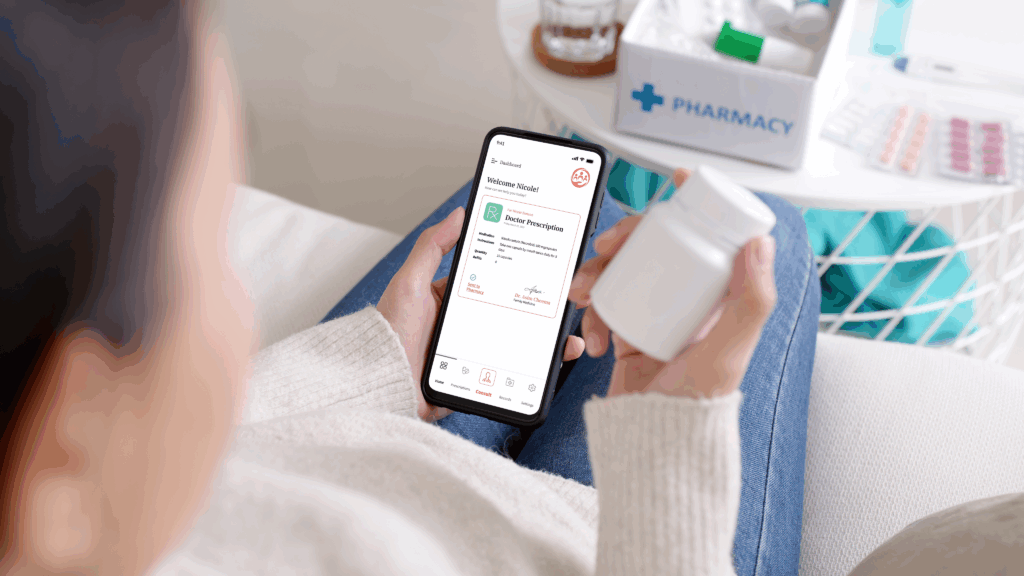Get Premenstrual Dysphoric Disorder (PMDD) Treatment Online
Is PMDD interfering with your social, personal, and professional life? Your Doctors Online brings self-care support, mental health counselling, doctor referrals, and prescription medications for PMDD. Chat with a licensed physician in 5 minutes. Receive evidence‑based care and start your healthcare journey today.

- No appointments or waiting rooms
- 24/7 private doctor consultations
- Instant prescription refills
- Serving all of Canada & the US

Trusted by millions for online doctor diagnosis
Over 1 million patients
5-star Doctor Ratings
4.8 Rating
20k+ App Reviews
4.6 Rating
1k+ Trustpilot Reviews
Why choose Your Doctors Online?
We are available 24/7 to serve you, so you don’t have to worry about any paperwork at all.
Personalized treatment plans
We evaluate your symptoms and provide treatment based on your condition.
Same-day prescriptions
The prescription is sent to the pharmacy within 5 minutes, so you can pick it up the same day.
Real-time prescription tracking
Track your virtual doctor visit and prescription arrival status through our application.
How it works
Getting virtual care at Your Doctors Online is fast, safe, and simple:
Become a member of our telehealth platform
Sign up, pay securely, and briefly describe your issue to get started.

Chat with a licensed doctor
A licensed physician will assess your PMDD symptoms and suggest a personalized treatment plan.

Get PMDD medication from the pharmacy
If prescribed, you can get your prescriptions refilled from your choice of pharmacy, mostly the same day.

What is Premenstrual Dysphoric Disorder (PMDD)?
PMDD is a more severe form of premenstrual syndrome (PMS), causing physical and emotional symptoms during every menstrual cycle in the week or two before your period. While the exact cause of PMDD is not known, it may occur due to normal hormonal changes, primarily Serotonin, a hormone that plays a crucial role in influencing mood, behaviour, and well-being.
PMDD Symptoms
Symptoms of PMDD typically start 1-2 weeks before your period and stop shortly after menstruation starts. Most people no longer experience PMDD symptoms after menopause. Women report the following mood, behaviour, and physical symptoms:
- Depression or hopelessness
- Feeling anxious
- Anger, irritability, or mood swings
- Loss of interest in usual activities
- Headache, fatigue and lack of energy
- Sleep problems (insomnia or oversleeping)
- Changes in appetite or food cravings
- Feeling lost or overwhelmed
- Breast tenderness or swelling
- Joint or muscle pain
- Bloating or weight fluctuations
PMDD treatment options
PMDD is a long-term (chronic) condition that requires medical attention and treatment. The right combination of treatment options can help manage or relieve symptoms:
- SSRIs (e.g., Prozac, Zoloft): Help balance mood-related symptoms
- Birth control pills: Can reduce symptoms by preventing ovulation
- Over-the-counter pain relievers or NSAIDS, including Naproxen and Mefenamic acid: Manage physical discomfort.
- Lifestyle changes: Regular exercise, improved sleep, and stress management
- Dietary changes: Reduce caffeine, sugar, and alcohol
- Supplements: Calcium, magnesium, and vitamin B6 may help
If you’re wondering whether you are a victim of PMDD, you can consult an Ob/Gyn for evaluation and diagnosis or a virtual doctor. Treatment plans are tailored to your needs and may include a combination of medication, therapy, and lifestyle support.
How to get online PMDD treatment?
At Your Doctors Online, we understand how disruptive PMDD can be to your daily life. Our licensed healthcare providers are available 24/7 to help you feel more in control from anywhere in Canada or the U.S. We provide:
- Online prescriptions for Fluoxetine (Prozac) and Escitalopram
- Prescription refills for Zoloft (Sertraline) and Citalopram
- Mental health counselling with licensed professionals
- Lab test requisitions, if needed
- Online nutritionist consultation for dietary plans

What PMDD medications we provide online
Prescriptions shouldn’t be complicated. From first click to final treatment, we make every step feel seamless so you can focus on feeling better.
Amoxicillin
Antibiotic
Clindamycin
Antibiotic
Augmentin
Antibiotic
Azithromycin
Antibiotic
Ceftin
Antibiotic
Meet our 24/7 available telehealth doctors

Dr. Asim Cheema is a board-certified Cardiology and Internal Medicine specialist with nearly 30+ years of clinical experience. He has been operating as an independent practitioner since 2001. He has worked at several leading healthcare institutions in Ontario, including Southlake Regional Health Centre in Newmarket and St. Michael’s Hospital in Toronto. He focuses on the diagnosis, management, and long-term care of complex cardiovascular and internal medicine conditions.

For more than eleven years, Dr. Marsha Dunkley has been committed to providing compassionate, comprehensive medical care to patients across Ontario, British Columbia, and Nova Scotia. Her clinical experience spans chronic conditions such as diabetes, hypertension, and high cholesterol and acute illnesses, including the common cold, seasonal allergies, influenza, and COVID-19.

Dr. Sohail Cheema is a seasoned pediatrician with 30+ years of experience. A 1987 graduate of Nishtar Medical College, he’s recognized for patient-centered care and clear communication. He's a member of the Royal College of Physicians (UK & Ireland) and certified in Ontario. He practices at Halton Healthcare – Georgetown and St. Michael’s Hospital in Toronto.
Dr. Stotland Mitchell is a board-certified Occupational Medicine physician with 5+ years of experience. He provides virtual care across all U.S. states and D.C., blending allopathic medicine with public health insights. His approach focuses on rapid symptom relief and long-term prevention, often resulting in faster recovery and improved health outcomes for his patients.

Dr. Mandy Leideman offers telehealth services and chronic care consultations to patients, whether insured or uninsured. With 30+ years of experience in general practice, she now focuses on long-term care and chronic disease prevention. Dr. Leideman is affiliated with several professional organizations, including the College of Physicians and Surgeons of Ontario, the Canadian College of Family Physicians, and the Canadian Medical Association.

Dr. Kieran Kettyls is a compassionate family physician who specializes in bariatric medicine, women’s health, and in-office procedures. Originally from Calgary, Alberta, he pursued his medical education and training internationally. He provides virtual care for patients across Alberta and British Columbia. He developed an AHS-covered weight loss program focusing on personalized care for obesity, metabolic, and hormonal health.

Dr. Katherine Killoran is a board-certified OB/GYN with over 25 years of experience supporting women through every stage of health. She did medicine from Boston University School of Medicine and completed her residency at the University of Colorado. A breast and cervical cancer survivor, Dr. Killoran offers deeply empathetic care, blending her clinical training with personal experience.

Dr. Richard Honaker is a board-certified physician with more than 40 years of experience in family and emergency medicine. He serves as Chief Medical Advisor at Your Doctors Online and is affiliated with Medical City Plano in Texas. Recognized multiple times by D Magazine and Texas Monthly, Dr. Honaker provides evidence-based care across a wide range of conditions including diabetes, hypertension, and injury care.

Dr. Monique Rainford is an OB/GYN expert and Assistant Clinical Professor at Yale School of Medicine. With 25+ years of experience, she’s led OB/GYN departments at Yale Health and Baltimore Medical System. Her clinical interests include pregnancy, menstrual health, chronic pelvic conditions, and lifestyle medicine. Dr. Rainford advocates for maternal health equity, especially in underserved communities.

Dr. Candice Fraser is an OB/GYN practitioner and founder of Trinity Medical Care. With over a decade of experience, she focuses on reproductive care, menstrual health, and menopause management. Along with medical training and residency, she also holds an MBA in healthcare management, blending business insight with clinical excellence.
Dr. Danielle DonDiego is a double board-certified Family and Obesity Medicine physician, business mentor, and author of Self-Care Rx. She focuses on helping patients manage weight, improve nutrition, and adopt sustainable lifestyle changes. A graduate of the Virginia College of Osteopathic Medicine with an MBA from Virginia Tech, she combines her medical expertise with a passion for patient education and long-term wellness.
Dr. Amber Robins is a double board-certified Family and Lifestyle Medicine physician with a strong focus on women’s health, preventive care, and patient advocacy. She earned her MD from the University of Rochester and an MBA from LSU-Shreveport. A published author and media contributor, she blends clinical expertise with a passion for empowering patients to make informed health decisions.
Dr. Nina Carroll is a retired OB/GYN with decades of experience serving women in the U.S. and abroad. She specialized in menopause care, sexual health, and trauma-informed women’s health. Today, she continues her work through medical writing, focusing on sexual minority women’s health and care for survivors of trauma.
Dr. Nerissa Bauer is a behavioral pediatrician specializing in ADHD, parenting strategies, and mental health in children. A former academic and AAP spokesperson, she is the creator of the TEACH Me ADHD program, helping families better understand and manage ADHD. She brings warmth, creativity, and evidence-based guidance to her work with patients and parents.
Frequently asked questions
How do you get diagnosed with PMDD?
Keep a daily symptom diary for at least two consecutive periods. Your doctor compares that record with DSM‑5 criteria, rules out thyroid or mood disorders, and may order basic labs for hormones or anemia.
Is PMDD a mental illness?
Although medical professionals refer to PMDD as an endocrine disorder because it relates to your hormones. But PMDD causes mental health symptoms as well as physical ones. For these reasons, PMDD is listed as a mental health problem as the DSM-5 criteria are included in the diagnosis.
When should I see my healthcare provider?
You should see a healthcare provider when mood swings or physical pain significantly affect your life, relationships, and career. Seek urgent help if you ever think of harming yourself.
What questions should I ask my healthcare provider?
While preparing for the consultation, you can focus on the following questions:
- Why do I have PMDD?
- What’s the best treatment for me?
- What side effects should I watch for?
- Do I need birth control?
- Can I track progress in the application?
Ready for your virtual visit? Speak to a doctor now!
How to treat PMDD without seeing a doctor?
If you’re diagnosed with PMDD, then for most women, symptom control would likely always require medical treatment from a doctor. Lifestyle changes can help with overall therapy. Our telehealth platform provides care without an office visit, including online prescriptions and certified doctor’s notes for work and school.
How can I manage PMDD with self-care?
Here are some self-care tips for managing PMDD:
- Use a calendar or app to monitor symptoms and plan activities around high and low symptom days.
- Try relaxation techniques like deep breathing, meditation, warm baths, or aromatherapy.
- Aim for 7–8 hours of sleep, keep a consistent sleep routine, and create a calm sleep environment.
- Focus on whole grains, fruits, and vegetables. Limit processed foods, caffeine, alcohol, salt, and sugar.
- Connect with others through online or local PMDD support communities, or speak to a therapist.
- Include things like uplifting music, nature walks, journaling, positive affirmations, or time with pets and loved ones.
What’s the difference between PMS and PMDD?
Both start in the luteal phase, but PMS causes mild‑to‑moderate discomfort. PMDD causes intense mood swings and anger issues that might disrupt work, school, or relationships. Think of PMDD as a disabling form of PMS that meets psychiatric diagnostic standards and almost always needs medical treatment.
What are the best antidepressants for PMDD?
Only a licensed physician can determine the best antidepressant for PMDD. Selective serotonin reuptake inhibitors, including sertraline (Zoloft), Fluoxetine (Prozac), Paroxetine (Paxil), and Escitalopram (Lexapro), remain the first line of treatment for people experiencing depression symptoms. Your doctor chooses based on prior response, side‑effect profile, and drug interactions. Learn more about our medications here.
What does a PMDD episode look like?
During the week before your period, you might feel sudden rage, hopelessness, crying spells, or panic along with breast pain, bloating, and fatigue. Symptoms fade within two or three days of menstruation, then return the next cycle unless treated.
Does PMDD get worse with age?
Symptoms often peak in the late 20s and 30s, then improve after menopause. Perimenopause can temporarily intensify them because hormone swings are greater. Ongoing monitoring lets you adjust your plans according to your life stage.
Can you cure PMDD naturally?
While there is no permanent natural cure, daily exercise, a calcium‑rich diet, omega‑3s, and supplements like chaste berry may lessen cramping and mood shifts. Remember, however, supplementation and dietary changes can only support your journey. They won’t replace the need for evidence‑based care.
Can I prevent PMDD?
You can’t stop the hormonal trigger entirely, but you can work on how it may have its impact. Track cycles, stay active, maintain steady blood sugar with balanced meals, and manage stress early. Regular check‑ups with our doctors allow you to adjust treatment according to your current health condition. Please visit a clinic or hospital if you feel any severe symptoms.

